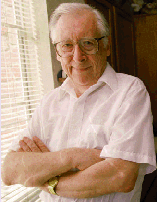|
Editorial-18 May 2004 |
|
Computational Quantum Chemistry - But What Good is It, Professor? |
Sir
John Pople shared the 1998 Nobel Prize for Chemistry with Walter Kohn -- Kohn received his share for his development of the density-functional theory and John
Pople for his development of computational methods in quantum chemistry.
received his share for his development of the density-functional theory and John
Pople for his development of computational methods in quantum chemistry.
Last month, following Poples death, age 78, Leo Radom, Professor of Chemistry at The University of Sydney wrote an incisive obituary of him for Nature. In the light of the recent announcement of Backing Australia's Ability 2 and its overweening emphasis on the commercialisation of scientific research its worth reflecting on John Pople's contributions and how their importance has grown over the years, not only for their specific merit but also to demonstrate the importance of Pople's academic foundation, the utilisation of improving technology which allowed the ready implementation of his contributions and the exceptional gift he had for communicating his subject. Radom makes the point, "Apart from being a brilliant researcher, Pople was also a great communicator, as anyone who heard him lecture will know. Some people have the knack of making simple things complicated. Pople kept simple things simple, and had the gift of making complicated material appear simple as well." In short, John Pople who was the quintessential basic research scientist made profound and lasting contributions to applied research and development as well as to pure research.
But in turn Pople's work rests on what one of the giants of theoretical physics, Paul Dirac summarised as, "The fundamental laws necessary for the mathematical treatment of large parts of physics and the whole of chemistry are... fully known, and the difficulty lies only in the fact that application of these laws leads to equations that are too complex to be solved."
It wasn't until increasingly powerful mainframe computers became available in the 1960s that the means came to hand to overcome the complexities of those equations. In the meantime Pople, a mathematical prodigy, took mathematics and physics at Cambridge but found himself becoming increasing interested in chemistry.
The amalgam of Pople's brilliance, his thorough grounding in mathematics and physics, his driving interest in chemistry, and the power of the newly available computers created the environment for quantum chemistry (the application of quantum mechanics to chemical problems) to emerge as a new branch of chemistry. Pople was not alone in working in this abstruse field but he is considering to have been its leading researcher. His theoretical contributions together with the computer programs he designed are the foundations of quantum chemistry and in fact his software is still used in both academe and industry. As Leo Radom writes, "[Computational quantum chemistry] has become a viable adjunct to experiment, and is used in solving fundamental problems," and then goes on to point out, "It is also being increasingly applied by industrial companies in more practical situations, such as the design of new drugs and new materials. It is especially valuable in studying substances that might be difficult to examine experimentally, for instance because they have a very short lifetime or are toxic or explosive."
Here then is a striking example of the importance of fostering fundamental research not only for the spin offs that are generated from the work per se but equally from the milieu generated by the intellects from which it is derived. To lust after innovation and development without investing in a sound foundation of fundamental science and outstanding research universities is a recipe for national cultural and economic senility.
Alex Reisner
The Funneled Web